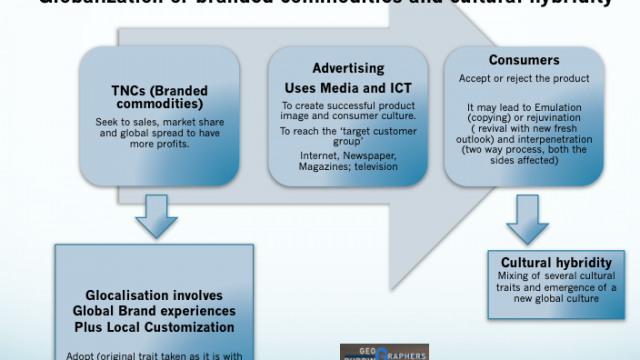| Terminology | Definition/Explanations |
|---|---|
| Consumer culture | To understand consumer culture, we should understand the difference between ‘need’ and ‘want’. Consumer culture is more than just a process of material transaction. It is a form of capitalism in which the economy is focused on the selling of consumer goods by creating artificial wants. The equation of personal happiness is seen to be linked with certain types of consumptions and the purchase of material possessions. Mass media is used for the dissemination of the consumer culture, which is very important to the success of many TNCs/MNCs. The mass media is used effectively to encourage consumers to want more than they need. The marketing industry uses all elements of the media to create a positive image of the products. It promotes the desire to keep up with one's peers, the belief that purchasing a new gadget or a piece of merchandise will improve quality of life or simply it will add a class label. |
| Benefits and drawbacks of consumer culture | Consumer culture can help to drive the economy by encouraging people to spend money. On the other hand, consumer culture emphasizes that happiness is brought by the possession of material things, it can encourage people to overspend. Personal debt is a significant financial problem in many countries including the United States. This is attributable at least in part to overspending. Consumer may enter into a vicious cycle wherein an individual repeatedly buys things to be happy or to keep up with the peers but not able to balance the financial burden associated. |
| What is a Brand? | Brand is a distinguishing name or symbol associated with the identity of a product or service. It is one of the most valuable assets of a company. Strong brands have the power to create considerable competitive and comparative advantage and can increase the revenue by ensuring high demand and market share. Branding increases profitability by commanding brand prices. At the same time, it reduces the cost and risk of introducing a new product due to a strong customer base. |
Glocalization of Branded commodities
The word glocalization signifies infusion of globalization and localization. It means when global companies adopting/adapting to local culture to be more competitive and to get the acceptance of the local customer. It is a marketing strategy that pinpoint the concept of Think Global and Act Local concept. Thomas Friedman defines glocalization as “the ability of a culture, when it encounters other strong cultures, to absorb influences that naturally fit into and can enrich the culture, to resist those things that are truly alien, and to compartmentalize those things that, while different, can nevertheless be enjoyed and celebrated as different” (Friedman, 1999).
McDonald’s, a globalized brand name in the fast food sector, resort to glocalization as a popular global marketing strategy for different regions or countries. For instance, the fast-food chain has beer or freshly brewed coffee in its product range in Germany, wine in France, mutton pies in Australia and McSpaghetti in Philippines, Veggie McNuggets, in India, McLobster in Canada, Teriyaki Burger in Japan and so on to appeal the local customers. McDonald’s also does not sale pork in the middle east countries. On the other hand, regionally produced Volkswagen cars in the Middle East have a compass for pointing towards Mecca and a shelf for the Koran, making them very popular within the muslim community, because it acknowledged their culture. On the other hand, Facebook previously approached the e-market with a ‘one-size-fits-all’ strategy, but now is facing the realities of cultural difference after loosing its market lead in Japan and China (refer: V. Simona’s paper on the global strategy of the global brands).
Examine how the cultural landscape has changed in chinese cities after Mcdonaldization.

